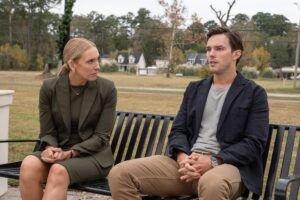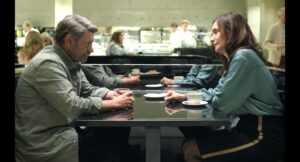I missed 85-year-old Francis Ford Coppola’s Megalopolis last year — the closest IMAX screen was a couple of hours away from Truro, and I didn’t want to see such a visual spectacle on a smallish screen. The movie got mostly negative reviews and barely any awards, but Coppola received plenty of media attention, and Megalopolis had a splashy theatrical release. For the most part, however, veteran talents in the latter-day movie industry get little respect.
I offer as cases in point two other 2024 releases by elderly directors, Clint Eastwood’s Juror #2 and Victor Erice’s Close Your Eyes, which had minimal theatrical bookings and a smattering of reviews. Both are currently available to stream and well worth it. I’d rate them among the best films of the year.

Eastwood, who will turn 95 in May, is largely responsible for his own tainted reputation. His ridiculous appearance at the 2012 Republican National Convention, where he sparred with an absent Obama in an empty chair, didn’t endear him to anyone, liberal or conservative. And his artistic legacy is erratic in the extreme. He follows brilliant work with absolute duds, which is largely due to his mix of ambition and quick-and-dirty production practices. If a script is problematic, he’ll shoot it anyway. For every Unforgiven, there are a couple of J. Edgars. He hasn’t had a solid hit in a while, though his longtime corporate partner, Warner Bros., has steadfastly financed his efforts.
Eastwood never hypes his material, perhaps because he doesn’t have it in him. But I think it’s a conscious matter of taste and style. What’s more, he always has a keen attraction to moral complexity and ambiguity. Because of that, movies like Richard Jewell and American Sniper are much better than ordinary genre flicks. And they’ve been largely ignored.
Which brings me to Juror #2. It’s a straightforward trial drama set in present-day Savannah, Ga. Nicholas Hoult plays Justin Kemp, a young journalist and recovering alcoholic with a pregnant wife (Zoey Deutch). He feels pressure at work and at home, and one night he stops at a bar and orders a drink. There he observes a young man and woman arguing and the woman leaving the bar. He stares at his drink but doesn’t touch it. On the drive home, he senses a thud and thinks he has hit something, figuring it to be an animal, perhaps a deer. He stops, gets out, and doesn’t see anything. It chills him, as does the close call with his sobriety at the bar.

Months later, with his wife close to her due date, Justin gets called for jury duty. During jury selection, he realizes that the young couple he saw arguing at the bar are the key players in the trial at hand: the man is accused of murdering the young woman, whose body was found off the road at the exact location where Justin thought he hit a deer.
Toni Collette plays the prosecutor, up for re-election. The case is supposedly open and shut, a win that she needs to bolster her chances at the polls. Justin has different concerns: he knows that if he were to come forward, it would render the case moot. The problem is, because he’s an alcoholic, his guilt in the victim’s death would be a foregone conclusion. What should he do? If he stays quiet and gets on the jury, he could help sway the verdict and remain unscathed. It’s a moral conundrum that gets deeper and deeper throughout the trial and beyond.
Juror #2 has a somewhat contrived script by Jonathan Abrams that Alfred Hitchcock would have played up to the hilt (see: The Wrong Man). Eastwood, in contrast, keeps things moving along with remarkably little affect. The result, curiously enough, is devastating and provocative. The movie is a deconstruction of justice with no closure. In my judgment, that’s the most truthful ending there could be.
Victor Erice, who will turn 85 this June, is at the other end of the movie spectrum from Eastwood and Hollywood. The Spanish auteur made his feature-film debut in 1973 with a masterwork — The Spirit of the Beehive — released two years before Franco’s death in 1975, as fascist rule in Spain was waning. The movie is a meditation on the movies, the loss of innocence, and transcendence, told through the eyes of Ana, a seven-year-old girl. It’s set in 1940, a year after Franco’s forces defeated the Spanish Republic in the country’s brutal civil war. Ana becomes obsessed with the monster in Frankenstein after watching the movie, believing that there is a special bond between them, much like the blind girl the monster befriends. Her sister tells her how to evoke the image in her bedroom at night: “Close your eyes.”
In the 50 years since his first film, Erice has shot only three more features. Ten years after Spirit of the Beehive, El Sur (“The South”), based on a novella by Adelaida García Morales, was released to lavish praise, but Erice says his producers wouldn’t allow him to make the last half of the film, giving the excuse that funding had run out. Erice considers the film “unfinished.” In 1992, he completed Dream of Light, a documentary about the Spanish painter Antonio López. And now, 30 years after Dream of Light, he has completed Close Your Eyes, an epic two-hour-and-49-minute look back into the past that may very well be his swan song.
Close Your Eyes is about a film director, Miguel Garay (Manolo Solo), who has spent the last 30 years subsisting, writing unpublished stories, and doing translations for money, living in a trailer on the Mediterranean coast. He comes to Madrid to do a reality-TV episode about the disappearance of a film star, Julio Arenas (Jose Coronado), during the filming of Miguel’s last feature, The Farewell Gaze. Julio’s disappearance led to the film shutting down, unfinished. The parallels with Erice’s own life are obvious, but Close Your Eyes is less a memoir than a fictional story that offers an artist’s statement: why he does what he does and why he invests so much in the medium of film.

Julio, who was an alcoholic and womanizer, was an old friend as well as a professional colleague of Miguel’s — they were sailors together as young men — and when he disappeared, Julio left behind lovers and a teenage daughter who is now middle-aged. In prepping for his TV interview, Miguel visits his old film editor, an old lover of his and Julio’s, and Julio’s daughter, Ana, played by Ana Torrent, the same actress who was the seven-year-old Ana of Spirit of the Beehive.
With each of Miguel’s encounters, and in clips of his film The Farewell Gaze, we learn more about Miguel and his feelings about work, love, and art. Everyone has a different theory as to whether Julio is alive or not — whether he died by suicide or just chose to vanish, starting life anew. Miguel returns to his coast home and then, out of the blue, gets word of the sighting of a man who may or may not be his long-lost friend Julio. He pursues the lead, bringing the story full circle.

Close Your Eyes is relatively undramatic and unhurried, a tale shrouded in mystery and gesture, sometimes sweet and human and sometimes lugubrious. But as a lover of the movies, I found its poetry irresistible. Spirit of the Beehive begins with a little girl watching a movie in the dark, captivated with its promise of wonderment. Close Your Eyes ends in much the same way.
During award season, Close Your Eyes was mostly overlooked. It takes a significant investment of time and of yourself to watch it, but I highly recommend it.



